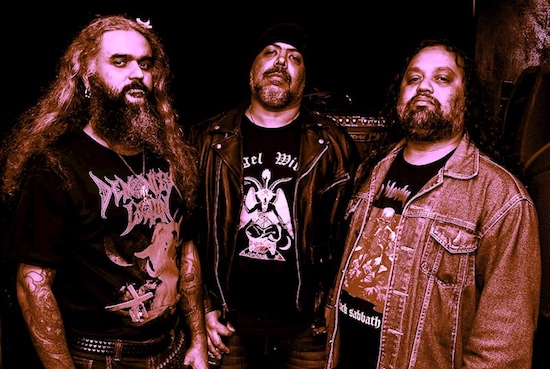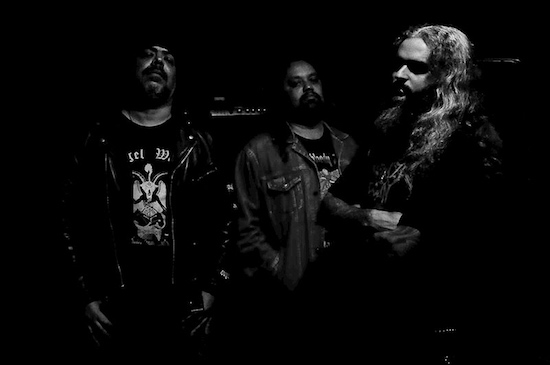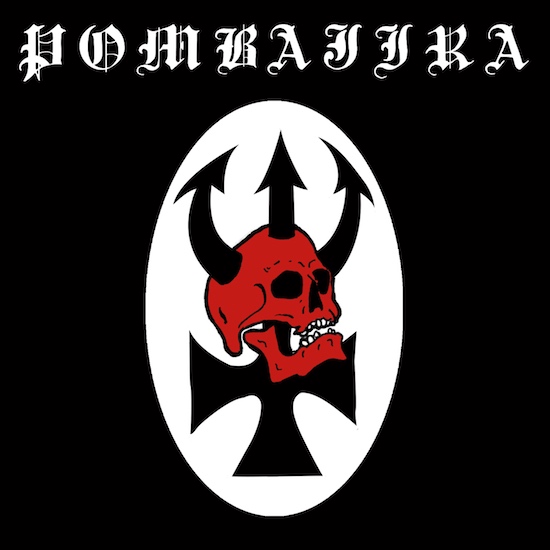Pombajira - Interview
Newly formed Brazilian metal band Pombajira featuring members of Grave Desecrator and Power From Hell, is set to release their self-titled debut album through Helldprod Records, November 29th, 2019. Self-branded as "Heavy Rock Inferno", you will have quite the experience with Pombajira, that musically encompasses a decent variety of styles, whilst conveying their message. MetalBite was given the opportunity to interview founder and front-man behind the entity, Hellson Röcha.
Alex

Why was Pombajira created?
Sincerely, I don't know exactly why, but probably the importance of a combination of aspects which embraced my personality lately. I was just interested to explore others textures, sonority and purposes. So, fortunately I had a great combination with the two other guys (Blizzard – guitars and T. Splatter – drums), and then the things started to take a good form. The wish to get back to our earliest musical influences from 70's Rock 'n' Roll, a little bit of psychedelic solos and references, Venom, Sabbath, Hellhammer, Pentagram etc... all are cornerstones which supported this creation.
How would you describe the Brazilian doom metal scene is it healthy?
Well, naturally Brazil is a huge country in all meanings, being in positive or negative ways. So, of course we do have a considerable amount of bands into any style here. To be sincere, I never pay attention in an unique or particular scene. But I can say, yeah, I've noticed very cool bands working fine with doom metal as well. Some of them have been taking attention outside Brazil, and that's something really cool!
What is the meaning behind the name Pombajira?
Pombajira (or more well known as Pomba Gira) is a mysterious female entity present in different views into afro-brazilian cults, such as Umbanda, Candomblé or Quimbanda. I must tell you that I do not own a leading erudition regarding those cults, and actually, it was never my goal. I can just express that since my childhood, I felt attracted to the occult that pervade the essence of all the entities which are in league with those cults. I feel Pombajira representing and embodying a marginalized essence which disturbs and defy the moralist shackles of our society, a rebellion and timeless spiritual conception.
Brazil has been a hotbed for many occult tales, experiences and activities; how has this shaped Pombajira's music?
We are a country rooted in misinformations that are part of a perverse structure that we have. Most of what you might have heard about us is probably a product with ordinary references. We have different cultures and traditions here, and all of them bring their own interpretations of spiritual and supernatural. I prefer to stimulate and flirt with the mystery and maybe let people have their own visions, since I use my perspectives collaborating with the foundation of these occult aspects you mentioned. I have no problems to express sometimes in a superstitious manner, as well as sometimes with a more deeply understanding. Most brazilians derived from catholical/protestant christian family heritages without even a decent insight about these dominating religions, and it leads them to an obscurantism that stimulate their fear and stupidity. Be sure that the band name "Pombajira" has caused oddness and reverences in the same time, and I think it's great! And then it comes with the asking for our experiences on this camp, as if our art must be essentially legitimated for the others. But of course that I had experienced, since my younger ages, something that may call attention for its enigmatic and obscure reasons. My mother was a follower and practicing of Candomblé, and I had direct contact with this religion back then (it doesn't mean that I follow or followed it). I saw things, I felt things which were not easy to explain, and I wrote about it in some of the lyrics.
Do you only 'flirt' with spiritual energies or do you take Afro-Brazilian spirituality seriously?
As I aforementioned, Pombajira was created to express my personal views, and it should stick to as for spiritual or material concept. I was never a disciplined person, so I was never bent to carry out something "religious" or ceremonial in my life, even that I was ever in deep interest with the occult. So as I chose music as a tool, I do not play or create anything which I can't have a serious and engaged devoted perform. We want to express us in a lawless and chaotic direction that will converge to a solid result.
What is the meaning behind the artwork that would strike most as being minimalist?
I could have commissioned to great artists in the underground to draw or paint something very complex and attractive for a cover art. But, you don't know, but I like to draw as well, and then I had the idea to have it intentionally basic, direct and straight to the minds! That symbol on cover has connection with what we are dealing with, the skull (life and death), the colors (blood and darkness), the divine trident up and the down part which represents the earth. I love minimalistic arts, as long as it has some feeling and purpose. I can't say that we'll represent us on this way forever, but as we sound as dirty and basic possible, maybe this kind of artwork suits better with our atmosphere and essence as a band, at least for now.
What would you say Pombajira offers in contrast to many other doom metal bands?
I don't think that we're only too close to doom metal as you mentioned, but of course it's a part of the cake. We've been too much unleashing our heavy/rock 'n' roll formulas and even crudest old fashioned black metal (Venom, early Bathory etc...), that I can't see only doom metal to categorize us. But no problem if so. I let these contrast to be compared and stimulated for those who listen to the songs and have their very own interpretation or interest. Anyway, I must clear up that we do not consider ourselves as a black metal band though. But people can judge it fairly. We do not care, even that it's exciting…
I have heard your debut full-length and I think it's a dirty and direct spear of doom metal; however did you plan to have deeper layers of sound by incorporating other instruments like keyboards?
Well, we've created something in a very primitive concept, where the loudest possible forms of heavy and rock could be perceived at a first sight. Along with dissonances, noisy and bluesy solos etc. Actually I don't see any connection of Pombajira with the additions of keyboards for a while. But we think that some percussions or something similar would sound quite interesting without losing the essence of the band, but it's something very expensive and would take a lot of hard work for a very small band as us. Let's see what future tells…
'The Lost Exit of Darkness' is a favorite off the record; would you care to expand on the message of this song? Or would you rather the listener assemble their own interpretation?
'The Lost Exit...' was composed by the guitarist Blizzard and I agree that's an amazing song! I could never imagine me as a vocalist, I never even tried in my life, and I've experienced a happy surprise about me with this song specially. I did the lyrics, and it fits with the song and its doomed march. I would say that's a song about choices, cause and effect. Obviously I can't explain in details something which has been created uncontrolled, like a spontaneous poetry. I tried to expose the sensation of being supposed in a crossroad, where your acts, choices and philosophies may affect you, and if there's actually a right and correct way to go along.
The album has a very garage metal feeling to it, something I often associate with Venom recordings; was this raw bare-bones sound on your debut record intentionally produced in honoring old bands you cite as influences?
According to our main influences, of course that we would never want something flawless and clean, in the worst meaning of these words. But the idea of simply honoring bands sounds a little bit poor in my opinion. Although we're pretty much crazy with this Venom recording for example, I hope that we have been creating something that won't stand us as a trend. We "pledge allegiance" to stay at the rawest side of what heavy metal and rock stands for!
Please tell us about what caused you to cut off your old drummer, thus replacing that person with T. Splatter?
T.Splatter was the greatest choice to date. Great maniacal friend! About the previous drummer?? Sorry, I won't waste time with him, as we've already wasted 1 year of hard work, time and money… Going for the next question…
Did you try bringing along any embers from Grave Desecrator for the ride?
Oh no! We're in constant contact, but GD and Pombajira have very different plans and conjectures.

Did recording the material for your debut prove to be a challenge in any way/s?
Yes, at least for myself. I feel Pombajira closer to me than Grave Desecrator was. I mean, I'm very proud of my long time with GD, but this band had not exactly representing what I have in mind lately. Not to blame the guys, we're very friends, but it's a matter of personal things. I needed to form Pombajira in order to externalize a lot of ideas I was keeping inside my cage. And fortunately, I have the company of very talented guys (at least for me), which I could never expect to play with, even that we know each other since a long time. Life's crazy!
You mention rebellion as an influence behind Pombajira's music; could you elaborate on that?
Pombajira is a synthesis of transgression and chocking values for hypocrite moralist flocks into a fanatical society, as the one we have been living in Brazil for example nowadays. It represents the lustful and uncontrolled abundance of feelings. Spiritually, it's basically a female entity living in another vibrational "world" track, very close to our reality, able to feel our fearful conditions and the terror that we face and oppress us all. This essence absolutely fits with what I and others, who have been awaken from a world of fraudulent freedom, thinks on this exact turbulent period of time, being in a metaphorical, political or immaterial mode of expression.
I hear a lot of potential to take Pombajira into new directions, specifically within the song 'Queen of the Night' through its horror-punk vibe; will there be more of this aspect in future releases?
Yeah, this song is very essence of rock 'n' roll, or maybe punk as you said. And that's why we brand us as Heavy Rock Inferno! We didn't promised anything different than this, despite our doomed essence. We tend to play to what sounds good into our references.
How did you attract the attention of Helldprod records?
Helldprod released some stuffs of Grave Desecrator back then. So, they were one of the labels that I got in touch to have a European release. Most of the labels even didn't answered our requests, others weren't interested, others praised, but their agendas are filled out. So, Helldprod showed interest and then we've been working fine.
What's being done to combat musical piracy (specifically metal) in Brazil? Are you satisfied with the efforts?
I don't think that piracy is menacing heavy metal in Brazil, at least most of the people who really have some decency in carrying on with this music, keeps on buying original stuffs and so on. Streaming is the new way, people are most interested in having their songs like a file. I can't stand with that, but I need to deal with. That's what we have for today.
Do any of the members practice rituals in honor of the deity?
I think you have it answered in previous questions again, but it's not the main factor in the making of our music wise. I'd say that of course if you're a Brazilian born around the presence of those above mentioned cults, you're supposed to have already taken part of any of the rituals or at least have a idea of what is all about.
Will Pombajira always be the center focus of the band's musical concepts or will you branch out to cover other deities that may or may not be related to Afro-Brazilian occultism?
No. If you check out the writings of songs like 'The Lost Exit...' or even 'Vital Lucifer', you will dive into other proposals.
Does your knowledge of Afro-Brazilian occultism have anything to do with your upbringing or was it all a sudden interest taken up?
There're much better persons really involved on it than us. For me, to have a presumptuous position about it would be absolutely stupid. The purpose of the band is not to be a herald of any cult or revelation. We've just follow and found a path to write and compose our music in a closer way to us, if you mean cultural/social/spiritual aspects. In a nutshell, we are just trying to see with our own eyes, instead of eyes which are not ours…
Upcoming Releases
- Morrath - Obscure Abominations - Feb 25
- Chalice - Divine Spear - Feb 27
- Blackwater Drowning - Obscure Sorrows - Feb 27
- Vide - Aux Enfants Des Ruines - Feb 27
- The Leaving - The Leaving - Mar 06
- Serpent Icon - Tombstone Stories - Mar 06
- Insect Inside - Reborn In Blight - Mar 06
- Triumpher - Piercing The Heart Of The World - Mar 06
- Lömsk - Act II - Of Iron And Blood - Mar 06
- God Against Humanity - The Judgement - Mar 06
- Miserere Luminis - Sidera - Mar 06
- Gravemass - This Is The Way - Mar 06
- Monstrosity - Screams From Beneath The Surface - Mar 13
- Against I - Anti Life - Mar 13
- Empire Of Disease - While Everything Collapses - Mar 19
- Hanging Garden - Isle Of Bliss - Mar 20
- Putred - Blestemul Din Adânc - Mar 20
- Gaerea - Loss - Mar 20
- Diatribes - Degenerate - Mar 20
- Hegeroth - Soaked In Rot - Mar 25

